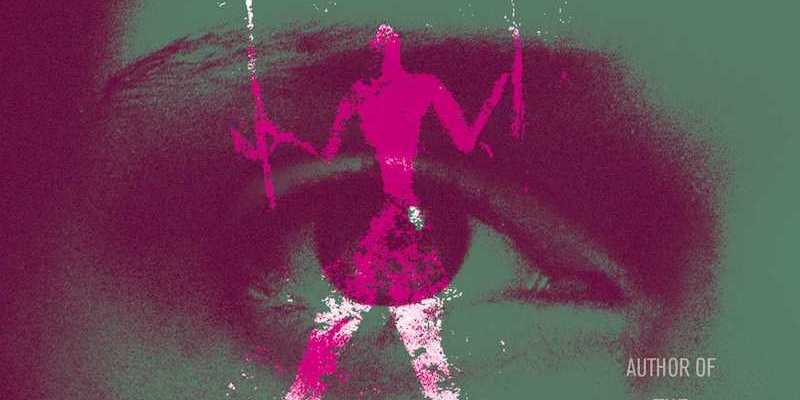
5 Book Reviews You Need to Read This Week
“You feel something vital and profound prowling around in the darkness beneath.”
Our quintet of quality reviews this week includes Lauren LeBlanc on Gayl Jones’ The Unicorn Woman, Ron Charles on Rachel Kushner’s Creation Lake, Katy Waldman on Helen Phillips’ Hum, Guy Lodge on Pedro Almodóvar’s The Last Dream, and Bea Setton on Priscilla Morris’ Black Butterflies.
Brought to you by Book Marks, Lit Hub’s home for book reviews.
*
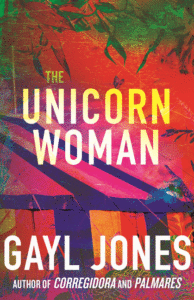
“[A] refreshingly idiosyncratic novel that manages to wear its seriousness lightly without ever losing sight of its significance … Jones plays with language—as much as character and plot—to illustrate the restorative nature of imagination … Jones reveals herself one of our most important American novelists … The awkwardness of his search echoes through the various misunderstandings that Buddy encounters. The medical professional who thinks he’s playing a prank on him by asking about whether humans can grow horns. The girlfriends who can’t grasp why he’s not serious. The co-worker who thinks he isn’t ready to settle down. This could be a grave book about alienation. Buddy could be a tragic figure out of place in American society. And he is; however, Jones has no intention of taking that well-worn road. Though Jones frames Buddy as a solitary man, haunted by an absence he can’t fill, he reaches outward. His search for the Unicorn Woman liberates him from the limitations of a circumscribed life …
Word play offers a sly ballast in a world where power is often wielded to great advantage. This artful verbal banter infuses Jones’s book with humor, something that her sharp-edged novels have often lacked … the book ultimately concerns itself with the origins of curiosity and passion as well as an abiding desire for endurance and the need to understand things for what they are, distinguishing between preaching and testifying, romance and love, community and exclusion, wiliness and wilderness, seeming and being … We are all the composite of culture, myth, religion, carnival, perceived wisdom, and projection, the product of history that overlaps and repeats itself. In a country hellbent on tearing down communities of color all the while celebrating freedom, how do we construct and maintain identity in the face of false mirrors? Asking these questions, Jones reveals herself one of our most important American novelists.”
–Lauren LeBlanc on Gayl Jones’ The Unicorn Woman (The Boston Globe)
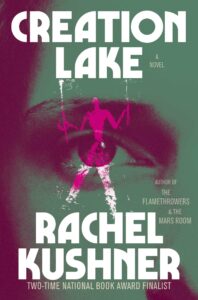
“Could the humble Neanderthals, who still lurk in our DNA, hold the secret to a better life? For Rachel Kushner’s new novel, Creation Lake, that question is the woolly mammoth in the room … bears all the hallmarks of her inquisitive mind and creative daring. The first satisfying surprise is that Kushner has designed this story as a spy thriller laced with a killer dose of deadpan wit … The story, told in short chapters that feel punchy even when they’re highly cerebral, slides around the labyrinth of Sadie’s mind, which is equally deceptive and deceived … Kushner inhabits the spy’s perspective with such eerie finesse that you feel how much fun she’s having …
Fans of Kushner’s earlier novels will recognize this well-informed critical strategy, her ability to satirize the absurdities and hypocrisies of revolutionary theorists without ceding any ground to the sterile forces of modern capitalism. If Creation Lake doesn’t have quite the same propulsive energy as Eleanor Catton’s environmental thriller Birnam Wood (2023), that’s only because Kushner is so continually lured into fascinating eddies of intellectual culture. The shores of this novel swell to include explorations of French politics and film and changing sexual mores … Elusive as Sadie remains, the real covert operative here is Kushner, who’s never felt more cunning than in this novel about the clashing ideological claims that have left us bereft at the end of time. Bore through this noir posing and wry satire of radical politics, and you feel something vital and profound prowling around in the darkness beneath.”
–Ron Charles on Rachel Kushner’s Creation Lake (The Washington Post)
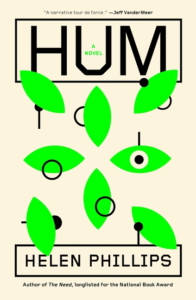
“Phillips specializes in imparting a gentle shimmer of uncanniness to the intimacies of domestic realism. Her novels draw on sci-fi and suspense tropes, but they tend not to be plot-driven or outwardly dramatic. Instead, Phillips writes meditative fables about marriage and motherhood, grounded in sensuous details (the ‘sizzle’ of seltzer, the ‘numbing calm’ of lotion) and interested in the material facts and affective textures of their characters’ lives. Hum, in particular, belongs to a class of recent fiction that entwines everyday descriptions of parenting with ecological anxiety …
In Phillips’s plausible dystopia, people rely on technology to compensate for ecological ruin; they bathe in the beauty of screens because they’ve made the physical world ugly. The book shrewdly connects maternal guilt to consumerism … Phillips keeps her world just one degree shy of recognizability, deftly turning the dials of similarity and difference, a mechanic fine-tuning eeriness instead of car engines … The hums may be the most utopian thing about Hum, yet they seem to herald a family that marches not to the beat of a heart but to the purr of a processor … The book seems to quell its larger anxieties—the charred forests, the bunnies—by redirecting focus to May’s guilt, allowing her, and, by extension, the reader, to revel in the pleasurable drama of shame and its release rather than think about an unthinkable future …
The book’s final pages offer May the gift of recognition, of being seen with love and tenderness. The evidence is weighed, the experts speak: she is worthy. It’s as if Phillips, like an overprotective parent, has swooped in to solve her narrator’s identity crisis—and to whisk the less tractable societal problems out of view. By making May’s recovery of her sense of motherliness, her caregiver’s identity, central to the plot, the book accepts her prioritization of her own ego and fetishizes what it portrays as May’s desperate devotion to her kids—an insistence on primal mom-love that wishes away the irresolution built into parenting. What was always true about raising a child is exquisitely true in the era of climate change: no one can absolve you or tell you with certainty that you succeeded. You live in the not-knowing, in the organ toward which the needle is moving, wondering whether, when it arrives, you might start to see.”
–Katy Waldman on Helen Phillips’ Hum (The New Yorker)
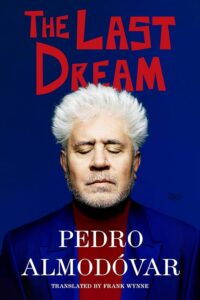
“Assembled from a presumably dense and disparate archive of prose written between the late 1960s and the present day, the book’s dozen selections mingle elaborately fantastical fictions with candid personal essays and the odd self-reflexive curio piece that sits somewhere in between. A tight, tidy foray into literature was never to be expected from the 74-year-old, whose utterly singular cinema thrives on chaotic melodrama and billowing, sensual abandon. If The Last Dream’sunruliness comes as no surprise—it’s a mixed bag both in its form and its rewards—its occasional crystalline terseness very much does …
The through line here is the restless churn of Almodóvar’s imagination and storytelling sensibility, with sexual, spiritual and cinematic fixations that we sense intrude as much on his everyday life as they do on his art … It’s when he writes directly as himself, however, that he writes best, as in the title piece—a sharp, wounded, six-page reflection on his mother’s death, where practical considerations of burial veils and family gatherings are disrupted by gnawing insecurities (did she ever like his films?)—and musings on what she might have dreamed of before she died. Such raw, conversational simplicity feels bracing, the book serving as an outlet for something Almodóvar can’t express from behind a camera. The fictional pieces, on the other hand, largely read as early treatments for films he either has made or never got around to shooting, which isn’t always to their advantage … The Last Dream has its pleasures—some of them lurid, some rather poignant—though at no point does it suggest an artist who has hitherto missed his calling.”
–Guy Lodge on Pedro Almodóvar’s The Last Dream (The Guardian)
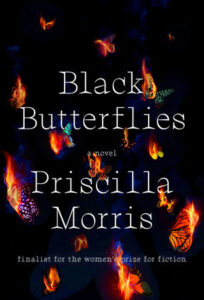
“After receiving the prestigious Legion of Honor award from the French president Emmanuel Macron in 2023, the Albanian writer Ismail Kadare told an interviewer that literature ‘transformed’ suffering ‘into a life force, a force which helped you survive and hold your head up and win out over dictatorship.’ Priscilla Morris affirms this response to the question of art’s value in times of war—particularly to those suffering most—in her debut novel … Morris is a brilliant writer of place. Her Sarajevo is finely drawn, as vividly rendered as Naguib Mahfouz’s Cairo. Readers will feel themselves walking the cobbled streets of the old town, nodding to the grandfathers playing chess in the shade of Orthodox churches, the skyline broken by cathedral spires and Ottoman-era minarets, the curves of the mountains that cradle Sarajevo visible beyond …
If the war beyond the city walls—the disintegration of Yugoslavia and the geopolitical roots of the violence—remains faceless and abstract, its effects on those confined within are visceral … Morris builds tension slowly, effectively. As the metaphorical bridges to the outside world are cut one by one—the airport, the phone lines, water, power—the claustrophobia increases, along with an awful suspense … This is a dark novel, but one that wrests beauty and hope out of suffering. It is a work of literature that transforms horror and violence into a life force.”
–Bea Setton on Priscilla Morris’ Black Butterflies (The New York Times Book Review)
Book Marks
Visit Book Marks, Lit Hub's home for book reviews, at https://bookmarks.reviews/ or on social media at @bookmarksreads.




















